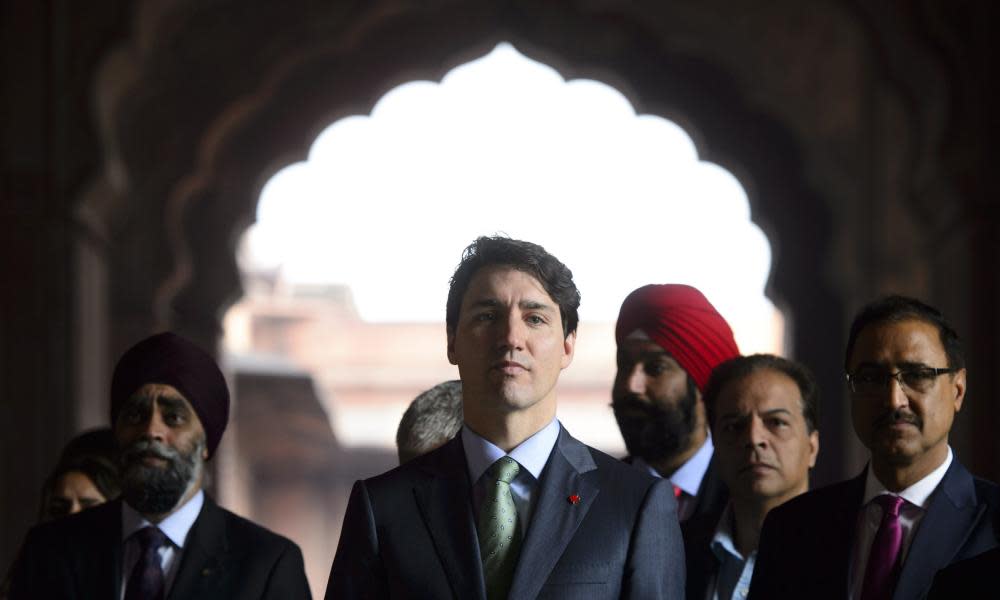Trudeau's India visit overshadowed by invitation to attempted murderer

Justin Trudeau’s state visit to India has been overshadowed by revelations that a businessman convicted of trying to assassinate an Indian minister in the 1980s was invited to several official events.
The week-long tour of the subcontinent has been dogged by suggestions the Canadian prime minister is being snubbed by his Indian counterpart, Narendra Modi, over his government’s alleged indulgence of Sikh separatists aiming to create an independent state within India for the religious minority.
The Canadian high commission in Delhi confirmed on Thursday it had sent, and has now rescinded, an official dinner invitation to Jaspal Atwal, a former member of a Sikh organisation regarded by India as a terrorist group.
Atwal was convicted in 1986 of trying to kill Malkiat Singh Sidhu, then a minister in the Punjab government, who was on vacation in Canada at the time. Sidhu survived the attempt but was later assassinated in India.
Photos were circulated on Thursday showing Atwal posing with Trudeau’s wife, Sophie Grégoire Trudeau, at an event in Mumbai earlier this week.
Trudeau told journalists he took the matter “very seriously”. “The individual in question should have never received an invitation,” he told reporters in Delhi. “The person and department responsible will take full responsibility for his actions.”
His office clarified Atwal was not part of Trudeau’s official delegation. A Canadian MP, Randeep Surai, admitted to organising the invitation. “I should have exercised better judgment, and I take full responsibility for my actions,” he said in a statement.
On Wednesday, Trudeau met with Amarinder Singh, the chief minister of Punjab state, which was the centre of decades of violent clashes, bombings and assassinations between Sikh separatists and the Indian state.
About 80,000 people are estimated to have died in the conflict, including the former Indian prime minister, Indira Gandhi, who was assassinated by her Sikh bodyguard after ordering Indian troops into Amritsar’s Golden Temple, one of the most revered spiritual sites in Sikhism.
The campaign was crushed in India by 1993 but its embers have been fanned by Sikh diasporas, especially in Canada, where Punjabi migrants and their descendants have become a rich voting block. Around 1.4m Canadians claim Indian descent.
Trudeau has previously boasted that his cabinet has more Sikhs than Modi’s and Canadian Sikh activists have succeeded in passing bills in provincial legislatures describing the anti-Sikh riots that followed Gandhi’s assassination as a “genocide” – terminology India balks at.
In past months, dozens of Sikh temples in Canada have also banned Indian officials from visiting in their official capacity.
After meeting Trudeau, Singh’s administration released a statement saying it had received “categorical assurance” that Canada rejected the idea of creating a separate Sikh state.
“Citing the separatist movement in Quebec, Trudeau said he had dealt with such threats all his life and was fully aware of the dangers of violence, which he had always pushed back with all his might,” the statement said.
Indian commentators have been watchful of any signs of frostiness between the two governments, highlighting the fact Modi sent a junior minister to greet Trudeau when he landed in India on Saturday.
Others pointed to the fact Modi, a prolific social media user, had not greeted Trudeau on Twitter, as he had sometimes done with other leaders.
India’s ministry for external affairs has denied suggestions of a snub. Modi and Trudeau will meet on Friday.
I hope PM @JustinTrudeau and his family had a very enjoyable stay so far. I particularly look forward to meeting his children Xavier, Ella-Grace, and Hadrien. Here is a picture from my 2015 Canada visit, when I'd met PM Trudeau and Ella-Grace. pic.twitter.com/Ox0M8EL46x
— Narendra Modi (@narendramodi) February 22, 2018

 Yahoo News
Yahoo News 
